Paper Menu >>
Journal Menu >>
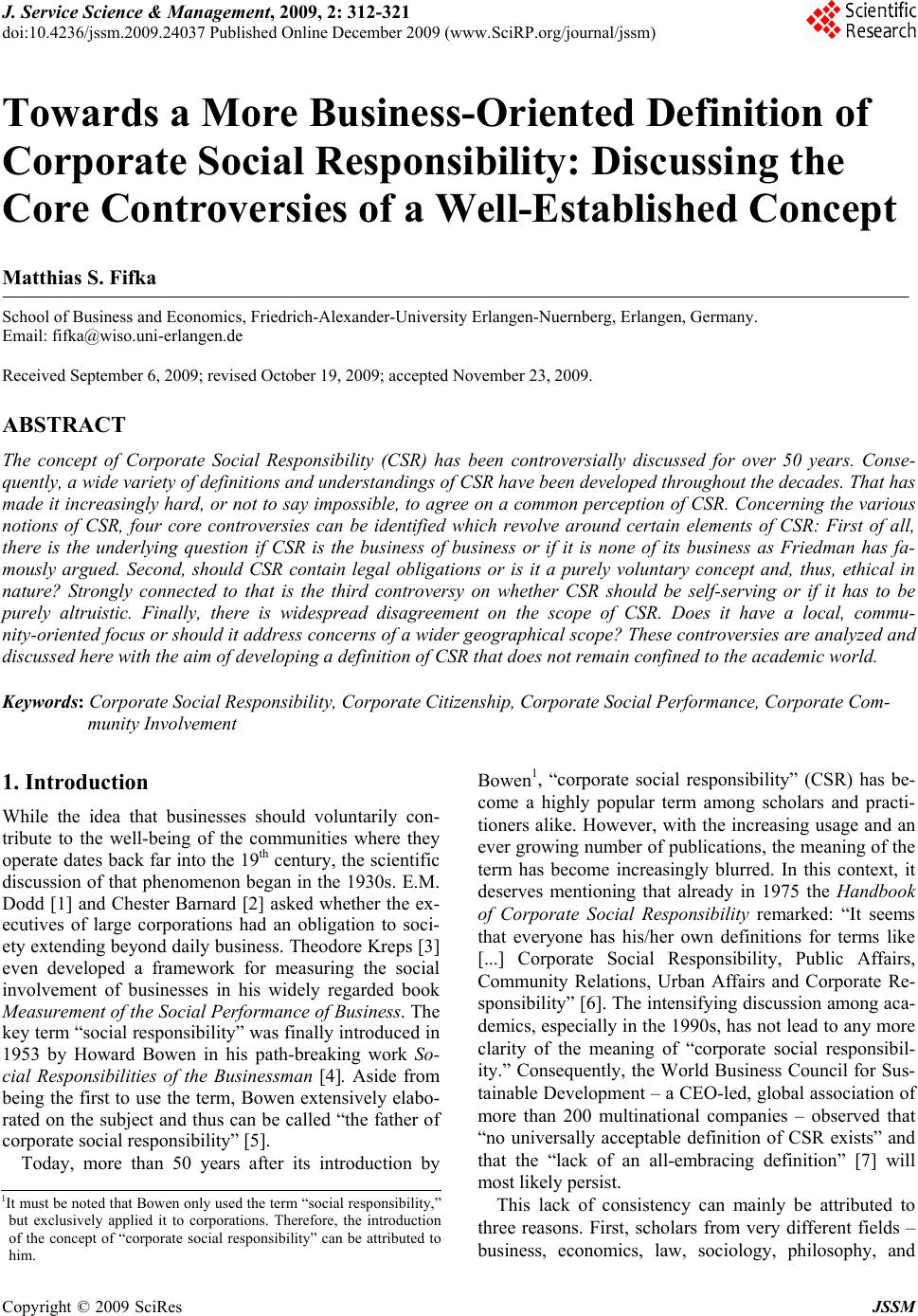 J. Service Science & Management, 2009, 2: 312-321 doi:10.4236/jssm.2009.24037 Published Online December 2009 (www.SciRP.org/journal/jssm) Copyright © 2009 SciRes JSSM Towards a More Business-Oriented Definition of Corporate Social Responsibility: Discussing the Core Controversies of a Well-Established Concept Matthias S. Fifka School of Business and Economics, Friedrich-Alexander-University Erlangen-Nuernberg, Erlangen, Germany. Email: fifka@wiso.uni-erlangen.de Received September 6, 2009; revised October 19, 2009; accepted November 23, 2009. ABSTRACT The concept of Corporate Social Responsibility (CSR) has been controversially discussed for over 50 years. Conse- quently, a wide variety of definitions and understandings of CSR have been developed throughout the decades. That has made it increasingly hard, or not to say impossible, to agree on a common perception of CSR. Concerning the various notions of CSR, four core controversies can be identified which revolve around certain elements of CSR: First of all, there is the underlying question if CSR is the business of business or if it is none of its business as Friedman has fa- mously argued. Second, should CSR contain legal obligations or is it a purely voluntary concept and, thus, ethical in nature? Strongly connected to that is the third controversy on whether CSR should be self-serving or if it has to be purely altruistic. Finally, there is widespread disagreement on the scope of CSR. Does it have a local, commu- nity-oriented focus or should it address concerns of a wider geographical scope? These controversies are analyzed and discussed here with the aim of developing a definition of CSR that does not remain confined to the academic world. Keywords: Corporate Social Responsibility, Corporate Citizenship, Corpor ate Social Performance, Corporate Com- munity Involvement 1. Introduction While the idea that businesses should voluntarily con- tribute to the well-being of the communities where they operate dates back far into the 19th century, the scientific discussion of that phenomenon began in the 1930s. E.M. Dodd [1] and Chester Barnard [2] asked whether the ex- ecutives of large corporations had an obligation to soci- ety extending beyond daily business. Theodore Kreps [3] even developed a framework for measuring the social involvement of businesses in his widely regarded book Measurement of the Social Performance of Business. The key term “social responsibility” was finally introduced in 1953 by Howard Bowen in his path-breaking work So- cial Responsibilities of the Businessman [4]. Aside from being the first to use the term, Bowen extensively elabo- rated on the subject and thus can be called “the father of corporate social responsibility” [5]. Today, more than 50 years after its introduction by Bowen1, “corporate social responsibility” (CSR) has be- come a highly popular term among scholars and practi- tioners alike. However, with the increasing usage and an ever growing number of publications, the meaning of the term has become increasingly blurred. In this context, it deserves mentioning that already in 1975 the Handbook of Corporate Social Responsibility remarked: “It seems that everyone has his/her own definitions for terms like [...] Corporate Social Responsibility, Public Affairs, Community Relations, Urban Affairs and Corporate Re- sponsibility” [6]. The intensifying discussion among aca- demics, especially in the 1990s, has not lead to any more clarity of the meaning of “corporate social responsibil- ity.” Consequently, the World Business Council for Sus- tainable Development – a CEO-led, global association of more than 200 multinational companies – observed that “no universally acceptable definition of CSR exists” and that the “lack of an all-embracing definition” [7] will most likely persist. 1It must be noted that Bowen only used the term “social responsibility,” b ut exclusively applied it to corporations. Therefore, the introduction of the concept of “corporate social responsibility” can be attributed to him. This lack of consistency can mainly be attributed to three reasons. First, scholars from very different fields – business, economics, law, sociology, philosophy, and 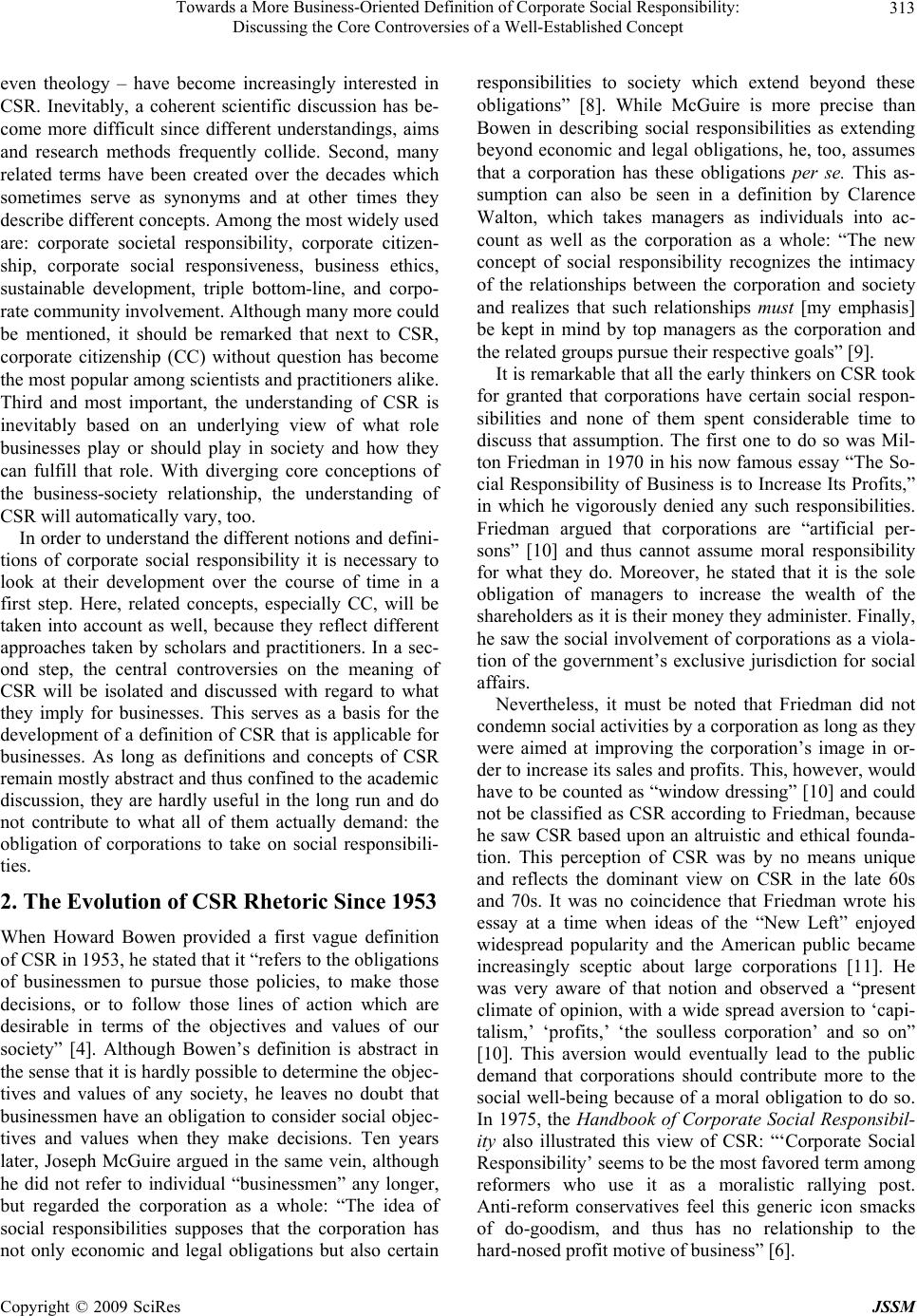 Towards a More Business-Oriented Definition of Corporate Social Responsibility: 313 Discussing the Core Controversies of a Well-Established Concept even theology – have become increasingly interested in CSR. Inevitably, a coherent scientific discussion has be- come more difficult since different understandings, aims and research methods frequently collide. Second, many related terms have been created over the decades which sometimes serve as synonyms and at other times they describe different concepts. Among the most widely used are: corporate societal responsibility, corporate citizen- ship, corporate social responsiveness, business ethics, sustainable development, triple bottom-line, and corpo- rate community involvement. Although many more could be mentioned, it should be remarked that next to CSR, corporate citizenship (CC) without question has become the most popular among scientists and practitioners alike. Third and most important, the understanding of CSR is inevitably based on an underlying view of what role businesses play or should play in society and how they can fulfill that role. With diverging core conceptions of the business-society relationship, the understanding of CSR will automatically vary, too. In order to understand the different notions and defini- tions of corporate social responsibility it is necessary to look at their development over the course of time in a first step. Here, related concepts, especially CC, will be taken into account as well, because they reflect different approaches taken by scholars and practitioners. In a sec- ond step, the central controversies on the meaning of CSR will be isolated and discussed with regard to what they imply for businesses. This serves as a basis for the development of a definition of CSR that is applicable for businesses. As long as definitions and concepts of CSR remain mostly abstract and thus confined to the academic discussion, they are hardly useful in the long run and do not contribute to what all of them actually demand: the obligation of corporations to take on social responsibili- ties. 2. The Evolution of CSR Rhetoric Since 1953 When Howard Bowen provided a first vague definition of CSR in 1953, he stated th at it “refers to the ob ligation s of businessmen to pursue those policies, to make those decisions, or to follow those lines of action which are desirable in terms of the objectives and values of our society” [4]. Although Bowen’s definition is abstract in the sense that it is hardly possib le to determine the objec- tives and values of any society, he leaves no doubt that businessmen have an obligation to consider social objec- tives and values when they make decisions. Ten years later, Joseph McGuire argued in the same vein, although he did not refer to individual “businessmen” any longer, but regarded the corporation as a whole: “The idea of social responsibilities supposes that the corporation has not only economic and legal obligations but also certain responsibilities to society which extend beyond these obligations” [8]. While McGuire is more precise than Bowen in describing social responsibilities as extending beyond economic and legal obligations, he, too, assumes that a corporation has these obligations per se. This as- sumption can also be seen in a definition by Clarence Walton, which takes managers as individuals into ac- count as well as the corporation as a whole: “The new concept of social responsibility recognizes the intimacy of the relationships between the corporation and society and realizes that such relationships must [my emphasis] be kept in mind by top managers as the corporation and the related groups pursue their respective goals” [9]. It is remarkable that all the early thinkers on CSR took for granted that corporations have certain social respon- sibilities and none of them spent considerable time to discuss that assumption. The first one to do so was Mil- ton Friedman in 1970 in his now famous essay “The So- cial Responsibility of Bu siness is to Increase Its Profits,” in which he vigorously denied any such responsibilities. Friedman argued that corporations are “artificial per- sons” [10] and thus cannot assume moral responsibility for what they do. Moreover, he stated that it is the sole obligation of managers to increase the wealth of the shareholders as it is their money they administer. Finally, he saw the social involvement of corporations as a viola- tion of the government’s exclusive jurisdiction for social affairs. Nevertheless, it must be noted that Friedman did not condemn social activities by a corporation as long as they were aimed at improving the corporation’s image in or- der to increase its sales and profits. This, however, would have to be counted as “window dressing” [10] and could not be classified as CSR according to Friedman, because he saw CSR based upon an altruistic and ethical founda- tion. This perception of CSR was by no means unique and reflects the dominant view on CSR in the late 60s and 70s. It was no coincidence that Friedman wrote his essay at a time when ideas of the “New Left” enjoyed widespread popularity and the American public became increasingly sceptic about large corporations [11]. He was very aware of that notion and observed a “present climate of opinion, with a wide spread aversion to ‘capi- talism,’ ‘profits,’ ‘the soulless corporation’ and so on” [10]. This aversion would eventually lead to the public demand that corporations should contribute more to the social well-being because of a moral obligation to do so. In 1975, the Handbook of Corporate Social Responsibil- ity also illustrated this view of CSR: “‘Corporate Social Responsibility’ seems to be the most favored term among reformers who use it as a moralistic rallying post. Anti-reform conservatives feel this generic icon smacks of do-goodism, and thus has no relationship to the hard-nosed profit motive of business” [6]. Copyright © 2009 SciRes JSSM 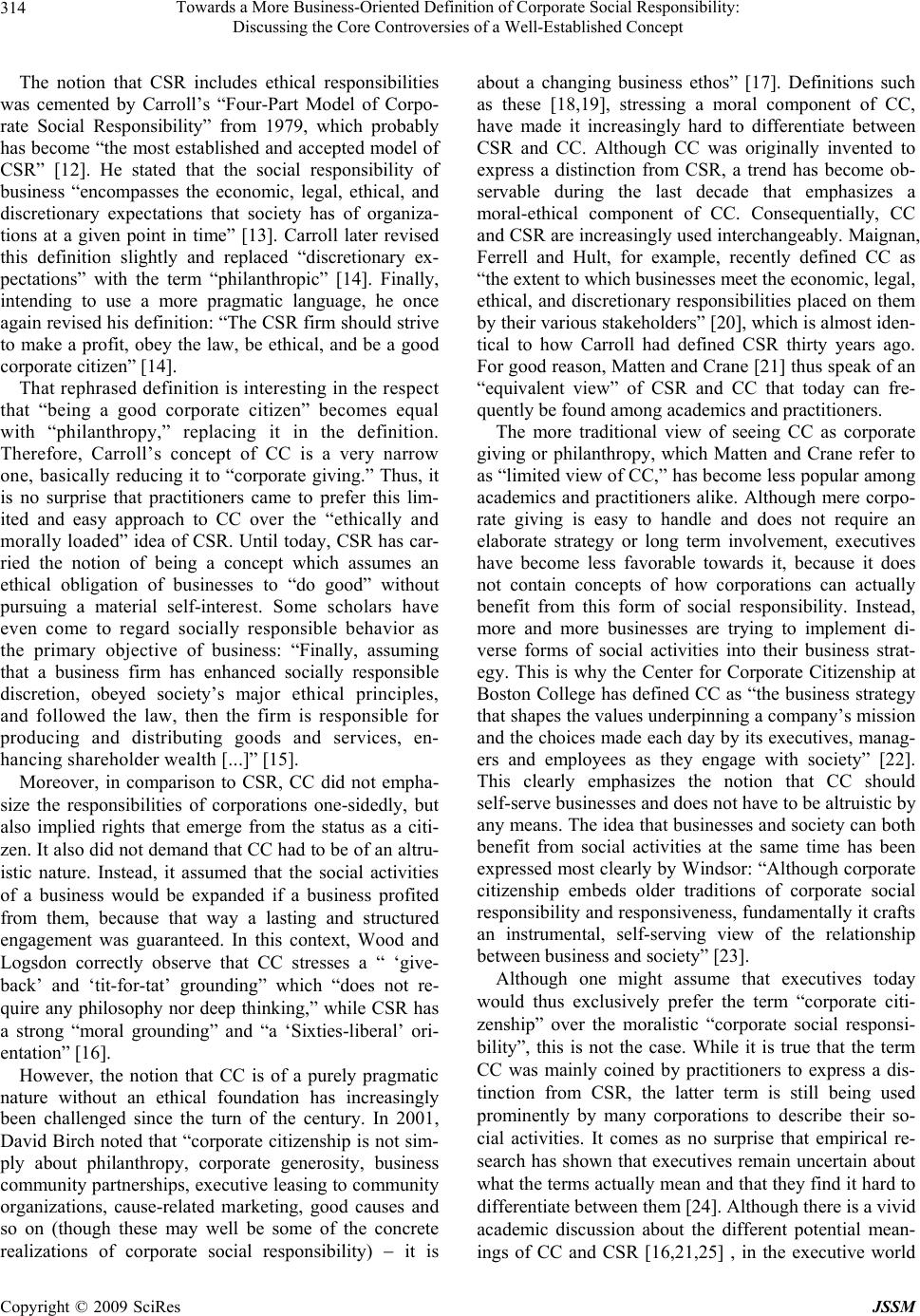 Towards a More Business-Oriented Definition of Corporate Social Responsibility: 314 Discussing the Core Controversies of a Well-Established Concept The notion that CSR includes ethical responsibilities was cemented by Carroll’s “Four-Part Model of Corpo- rate Social Responsibility” from 1979, which probably has become “the most established and accepted model of CSR” [12]. He stated that the social responsibility of business “encompasses the economic, legal, ethical, and discretionary expectations that society has of organiza- tions at a given point in time” [13]. Carroll later revised this definition slightly and replaced “discretionary ex- pectations” with the term “philanthropic” [14]. Finally, intending to use a more pragmatic language, he once again revised his definition: “The CSR firm should strive to make a profit, obey the law, be ethical, and be a good corporate citizen” [14]. That rephrased definition is interesting in the respect that “being a good corporate citizen” becomes equal with “philanthropy,” replacing it in the definition. Therefore, Carroll’s concept of CC is a very narrow one, basi cally r educing it to “corporate giving.” Thus, it is no surprise that practitioners came to prefer this lim- ited and easy approach to CC over the “ethically and mo ral ly l oaded” idea of CSR. Until today, CSR has car- ried the notion of being a concept which assumes an ethical obligation of businesses to “do good” without pursuing a material self-interest. Some scholars have even come to regard socially responsible behavior as the primary objective of business: “Finally, assuming that a business firm has enhanced socially responsible discretion, obeyed society’s major ethical principles, and followed the law, then the firm is responsible for producing and distributing goods and services, en- hancing shareholder wealth [...]” [15]. Moreover, in comparison to CSR, CC did not empha- size the responsibilities of corporations one-sidedly, but also implied rights that emerge from the status as a citi- zen. It also did not demand that CC had to be of an altru- istic nature. Instead, it assumed that the social activities of a business would be expanded if a business profited from them, because that way a lasting and structured engagement was guaranteed. In this context, Wood and Logsdon correctly observe that CC stresses a “ ‘give- back’ and ‘tit-for-tat’ grounding” which “does not re- quire any philosophy nor deep thinking,” while CSR has a strong “moral grounding” and “a ‘Sixties-liberal’ ori- entation” [16]. However, the notion that CC is of a purely pragmatic nature without an ethical foundation has increasingly been challenged since the turn of the century. In 2001, David Birch noted that “corporate citizenship is not sim- ply about philanthropy, corporate generosity, business community partnerships, executive leasing to community organizations, cause-related marketing, good causes and so on (though these may well be some of the concrete realizations of corporate social responsibility) it is about a changing business ethos” [17]. Definitions such as these [18,19], stressing a moral component of CC, have made it increasingly hard to differentiate between CSR and CC. Although CC was originally invented to express a distinction from CSR, a trend has become ob- servable during the last decade that emphasizes a moral-ethical component of CC. Consequentially, CC and CSR are increasingly used interchangeably. Maignan, Ferrell and Hult, for example, recently defined CC as “the extent to which businesses meet the economic, legal, ethical, and discretionary responsibilities placed on them by their various stakeholders” [20], which is almost iden- tical to how Carroll had defined CSR thirty years ago. For good reason, Matten and Crane [21] thus speak of an “equivalent view” of CSR and CC that today can fre- quently be found among academics and practitioners. The more traditional view of seeing CC as corporate giving or philanthropy, which Matten and Crane refer to as “limited view of CC,” has become less popular among academics and practitioners alike. Although mere corpo- rate giving is easy to handle and does not require an elaborate strategy or long term involvement, executives have become less favorable towards it, because it does not contain concepts of how corporations can actually benefit from this form of social responsibility. Instead, more and more businesses are trying to implement di- verse forms of social activities into their business strat- egy. This is why the Center for Corporate Citizenship at Boston College has defined CC as “the business strategy that shapes the values underpinning a company’s mission and the choices made each day by its executives, manag- ers and employees as they engage with society” [22]. This clearly emphasizes the notion that CC should self-serve businesses and does not have to be altruistic by any means. The idea that businesses and society can both benefit from social activities at the same time has been expressed most clearly by Windsor: “Although corporate citizenship embeds older traditions of corporate social responsibility and respon siveness, fundamentally it crafts an instrumental, self-serving view of the relationship between business and society” [23]. Although one might assume that executives today would thus exclusively prefer the term “corporate citi- zenship” over the moralistic “corporate social responsi- bility”, this is not the case. While it is true that the term CC was mainly coined by practitioners to express a dis- tinction from CSR, the latter term is still being used prominently by many corporations to describe their so- cial activities. It comes as no surprise that empirical re- search has shown that executives remain uncertain about what the terms actually mean and that they find it hard to differentiate between them [24]. Although there is a vivid academic discussion about the different potential mean- ings of CC and CSR [16,21,25] , in the executive world Copyright © 2009 SciRes JSSM 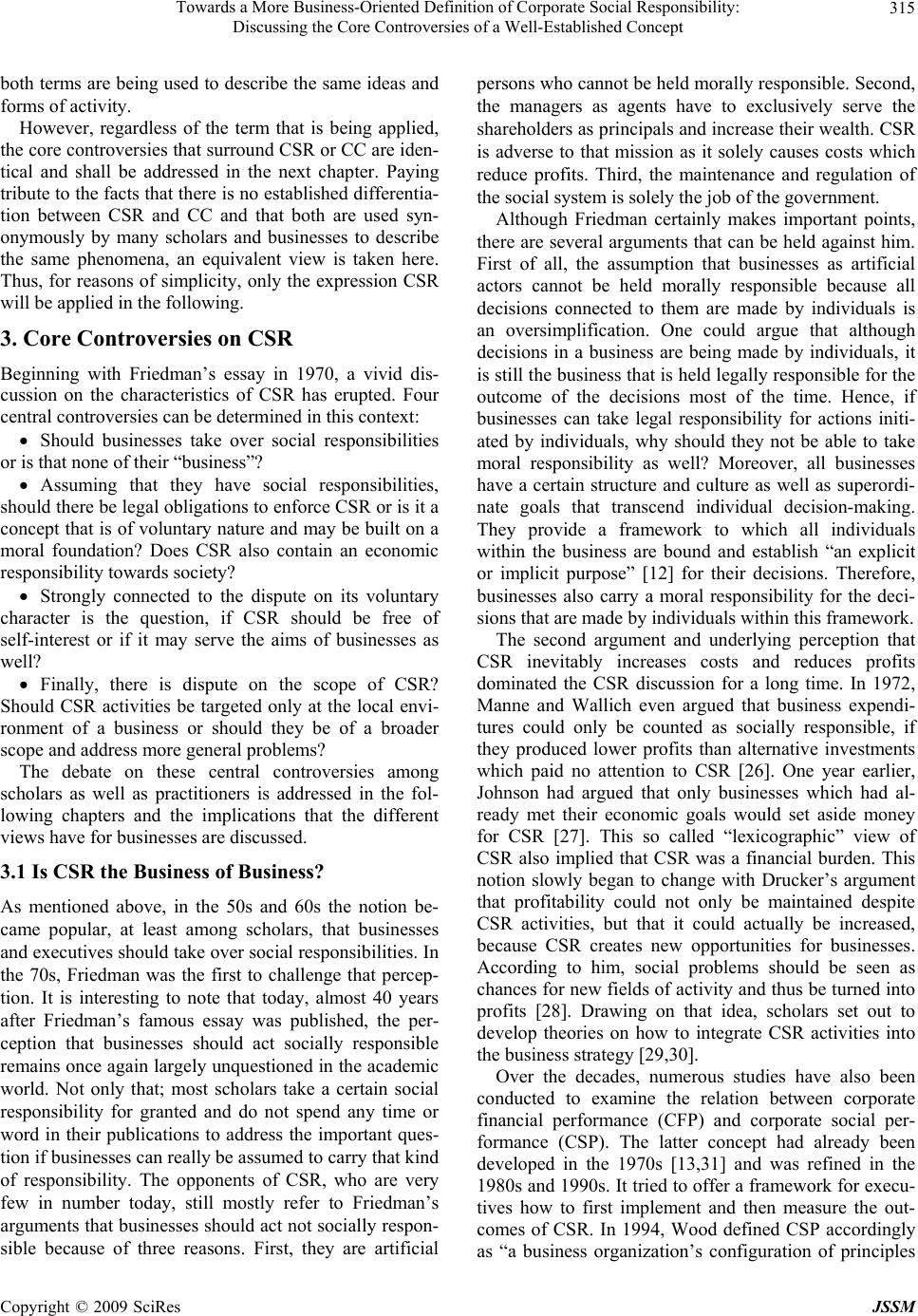 Towards a More Business-Oriented Definition of Corporate Social Responsibility: 315 Discussing the Core Controversies of a Well-Established Concept both terms are being used to describe the same ideas and forms of activity. However, regardless of the term that is being applied, the core controversies that surround CSR or CC are iden- tical and shall be addressed in the next chapter. Paying tribute to the facts that there is n o established differen tia- tion between CSR and CC and that both are used syn- onymously by many scholars and businesses to describe the same phenomena, an equivalent view is taken here. Thus, for reasons of simplicity, only the expression CSR will be applied in the following. 3. Core Controversies on CSR Beginning with Friedman’s essay in 1970, a vivid dis- cussion on the characteristics of CSR has erupted. Four central controversies can be determined in this context: Should businesses take over social responsibilities or is that none of their “business”? Assuming that they have social responsibilities, should there be legal oblig ations to enfo rce CSR or is it a concept that is of voluntary nature and may be built o n a moral foundation? Does CSR also contain an economic responsibility towards so ciety? Strongly connected to the dispute on its voluntary character is the question, if CSR should be free of self-interest or if it may serve the aims of businesses as well? Finally, there is dispute on the scope of CSR? Should CSR activities be targeted only at the local envi- ronment of a business or should they be of a broader scope and address more general problems? The debate on these central controversies among scholars as well as practitioners is addressed in the fol- lowing chapters and the implications that the different views have for businesses are discusse d . 3.1 Is CSR the Business of Business? As mentioned above, in the 50s and 60s the notion be- came popular, at least among scholars, that businesses and executiv es shou ld tak e over social responsib ilities. In the 70s, Friedman was the first to challenge that percep- tion. It is interesting to note that today, almost 40 years after Friedman’s famous essay was published, the per- ception that businesses should act socially responsible remains once again largely unquestioned in the academic world. Not only that; most scholars take a certain social responsibility for granted and do not spend any time or word in their publications to address the important ques- tion if businesses can really be assumed to carry that kind of responsibility. The opponents of CSR, who are very few in number today, still mostly refer to Friedman’s arguments that businesses should act not socially respon- sible because of three reasons. First, they are artificial persons who cannot be held morally responsible. Second, the managers as agents have to exclusively serve the shareholders as principals and increase their wealth. CSR is adverse to that mission as it solely causes costs which reduce profits. Third, the maintenance and regulation of the social system is solely the job of the government. Although Friedman certainly makes important points, there are several arguments that can be held against him. First of all, the assumption that businesses as artificial actors cannot be held morally responsible because all decisions connected to them are made by individuals is an oversimplification. One could argue that although decisions in a business are being made by individuals, it is still the business th at is held legally responsible for the outcome of the decisions most of the time. Hence, if businesses can take legal responsibility for actions initi- ated by individuals, why should they not be able to take moral responsibility as well? Moreover, all businesses have a certain structure and culture as well as superordi- nate goals that transcend individual decision-making. They provide a framework to which all individuals within the business are bound and establish “an explicit or implicit purpose” [12] for their decisions. Therefore, businesses also carry a moral responsibility for the deci- sions that are made by individuals within this framework. The second argument and underlying perception that CSR inevitably increases costs and reduces profits dominated the CSR discussion for a long time. In 1972, Manne and Wallich even argued that business expendi- tures could only be counted as socially responsible, if they produced lower profits than alternative investments which paid no attention to CSR [26]. One year earlier, Johnson had argued that only businesses which had al- ready met their economic goals would set aside money for CSR [27]. This so called “lexicographic” view of CSR also implied that CSR was a financial burden. This notion slowly began to change with Drucker’s argument that profitability could not only be maintained despite CSR activities, but that it could actually be increased, because CSR creates new opportunities for businesses. According to him, social problems should be seen as chances for new fields of activity and thus be turned into profits [28]. Drawing on that idea, scholars set out to develop theories on how to integrate CSR activities into the business strategy [29,30]. Over the decades, numerous studies have also been conducted to examine the relation between corporate financial performance (CFP) and corporate social per- formance (CSP). The latter concept had already been developed in the 1970s [13,31] and was refined in the 1980s and 1990s. It tried to offer a framework for execu- tives how to first implement and then measure the out- comes of CSR. In 1994, Wood defined CSP accordingly as “a business organization’s configuration of principles Copyright © 2009 SciRes JSSM 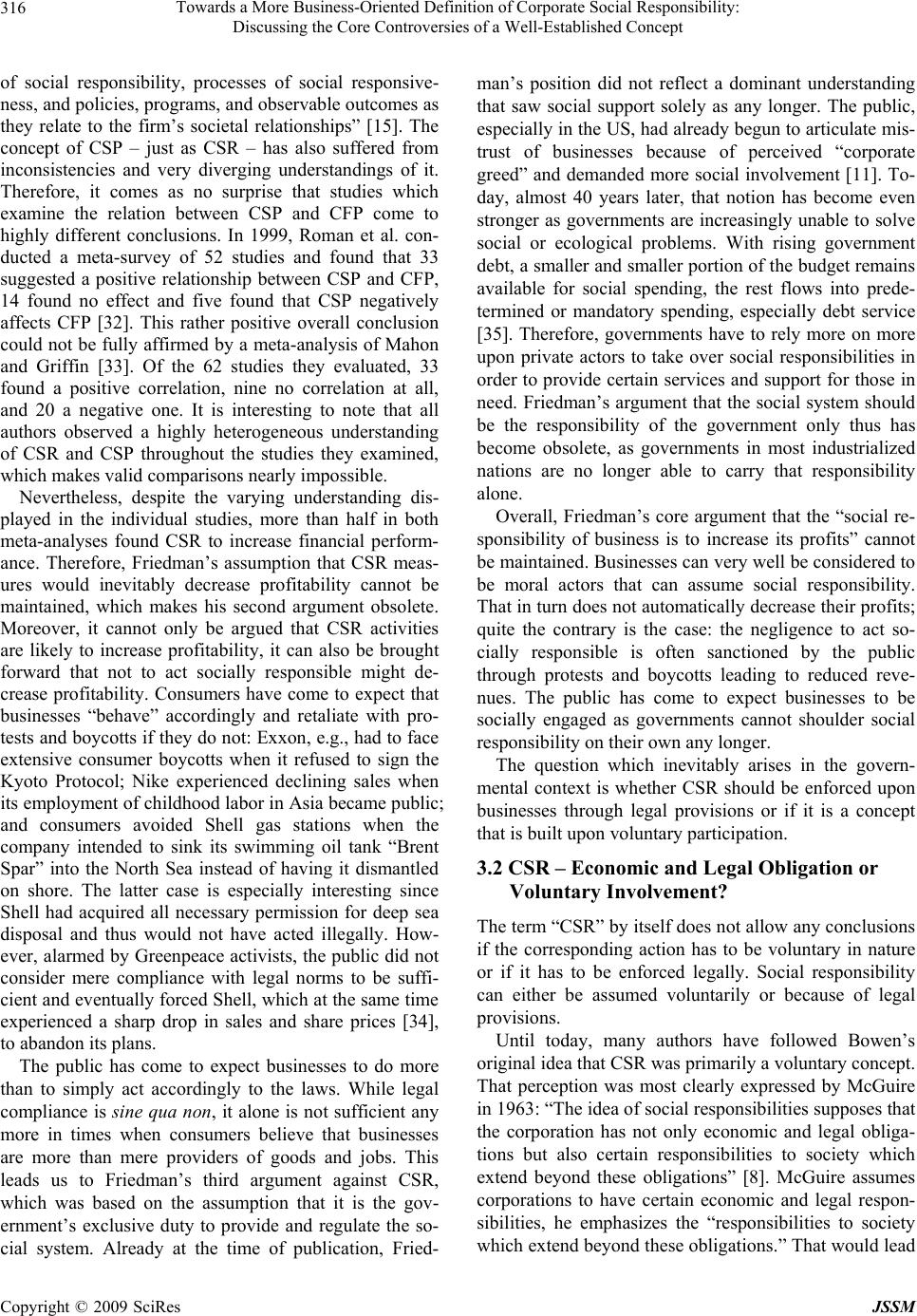 Towards a More Business-Oriented Definition of Corporate Social Responsibility: 316 Discussing the Core Controversies of a Well-Established Concept of social responsibility, processes of social responsive- ness, and policies, programs, and observable outcomes as they relate to the firm’s societal relationships” [15]. The concept of CSP – just as CSR – has also suffered from inconsistencies and very diverging understandings of it. Therefore, it comes as no surprise that studies which examine the relation between CSP and CFP come to highly different conclusions. In 1999, Roman et al. con- ducted a meta-survey of 52 studies and found that 33 suggested a positive relationship between CSP and CFP, 14 found no effect and five found that CSP negatively affects CFP [32]. This rather positive overall conclusion could not be fully affirmed by a meta-analysis of Mahon and Griffin [33]. Of the 62 studies they evaluated, 33 found a positive correlation, nine no correlation at all, and 20 a negative one. It is interesting to note that all authors observed a highly heterogeneous understanding of CSR and CSP throughout the studies they examined, which makes valid comparisons nearly impossible. Nevertheless, despite the varying understanding dis- played in the individual studies, more than half in both meta-analyses found CSR to increase financial perform- ance. Therefore, Friedman’s assumption that CSR meas- ures would inevitably decrease profitability cannot be maintained, which makes his second argument obsolete. Moreover, it cannot only be argued that CSR activities are likely to increase profitability, it can also be brought forward that not to act socially responsible might de- crease profitability. Consumers have come to expect that businesses “behave” accordingly and retaliate with pro- tests and boycotts if they do not: Exxon, e.g., had to face extensive consumer boycotts when it refused to sign the Kyoto Protocol; Nike experienced declining sales when its employment of childh ood labor in Asia became public; and consumers avoided Shell gas stations when the company intended to sink its swimming oil tank “Brent Spar” into the North Sea instead of having it dismantled on shore. The latter case is especially interesting since Shell had acquired all necessary permission for deep sea disposal and thus would not have acted illegally. How- ever, alarmed by Greenpeace activists, the public did not consider mere compliance with legal norms to be suffi- cient and eventu ally forced Shell, which at the same time experienced a sharp drop in sales and share prices [34], to abandon its plans. The public has come to expect businesses to do more than to simply act accordingly to the laws. While legal compliance is sine qua non, it alone is not sufficient any more in times when consumers believe that businesses are more than mere providers of goods and jobs. This leads us to Friedman’s third argument against CSR, which was based on the assumption that it is the gov- ernment’s exclusive duty to provide and regulate the so- cial system. Already at the time of publication, Fried- man’s position did not reflect a dominant understanding that saw social support solely as any longer. The public, especially in the US, had already begun to articulate mis- trust of businesses because of perceived “corporate greed” and demanded more social involvement [11]. To- day, almost 40 years later, that notion has become even stronger as governments are increasingly unable to solve social or ecological problems. With rising government debt, a smaller and smaller portion of the budget remains available for social spending, the rest flows into prede- termined or mandatory spending, especially debt service [35]. Therefore, governments have to rely more on more upon private actors to take over social responsibilities in order to provide certain services and support for those in need. Friedman’s argument that the social system should be the responsibility of the government only thus has become obsolete, as governments in most industrialized nations are no longer able to carry that responsibility alone. Overall, Friedman’s core argument that the “social re- sponsibility of business is to increase its profits” cannot be maintained. Businesses can very well be considered to be moral actors that can assume social responsibility. That in turn does not au tomatically decrease their profits; quite the contrary is the case: the negligence to act so- cially responsible is often sanctioned by the public through protests and boycotts leading to reduced reve- nues. The public has come to expect businesses to be socially engaged as governments cannot shoulder social responsibility on their own any longer. The question which inevitably arises in the govern- mental context is whether CSR should be enforced upon businesses through legal provisions or if it is a concept that is built upon volun tary participation. 3.2 CSR – Economic and Legal Obligation or Voluntary Involvement? The term “CSR” by itself does not allow any conclusions if the corresponding action has to be voluntary in nature or if it has to be enforced legally. Social responsibility can either be assumed voluntarily or because of legal provisions. Until today, many authors have followed Bowen’s original idea that CSR was primarily a voluntary concept. That perception was most clearly expressed by McGuire in 1963: “The idea of social responsibilities suppo ses that the corporation has not only economic and legal obliga- tions but also certain responsibilities to society which extend beyond these obligations” [8]. McGuire assumes corporations to have certain economic and legal respon- sibilities, he emphasizes the “responsibilities to society which extend beyond these obligations.” That would lead Copyright © 2009 SciRes JSSM 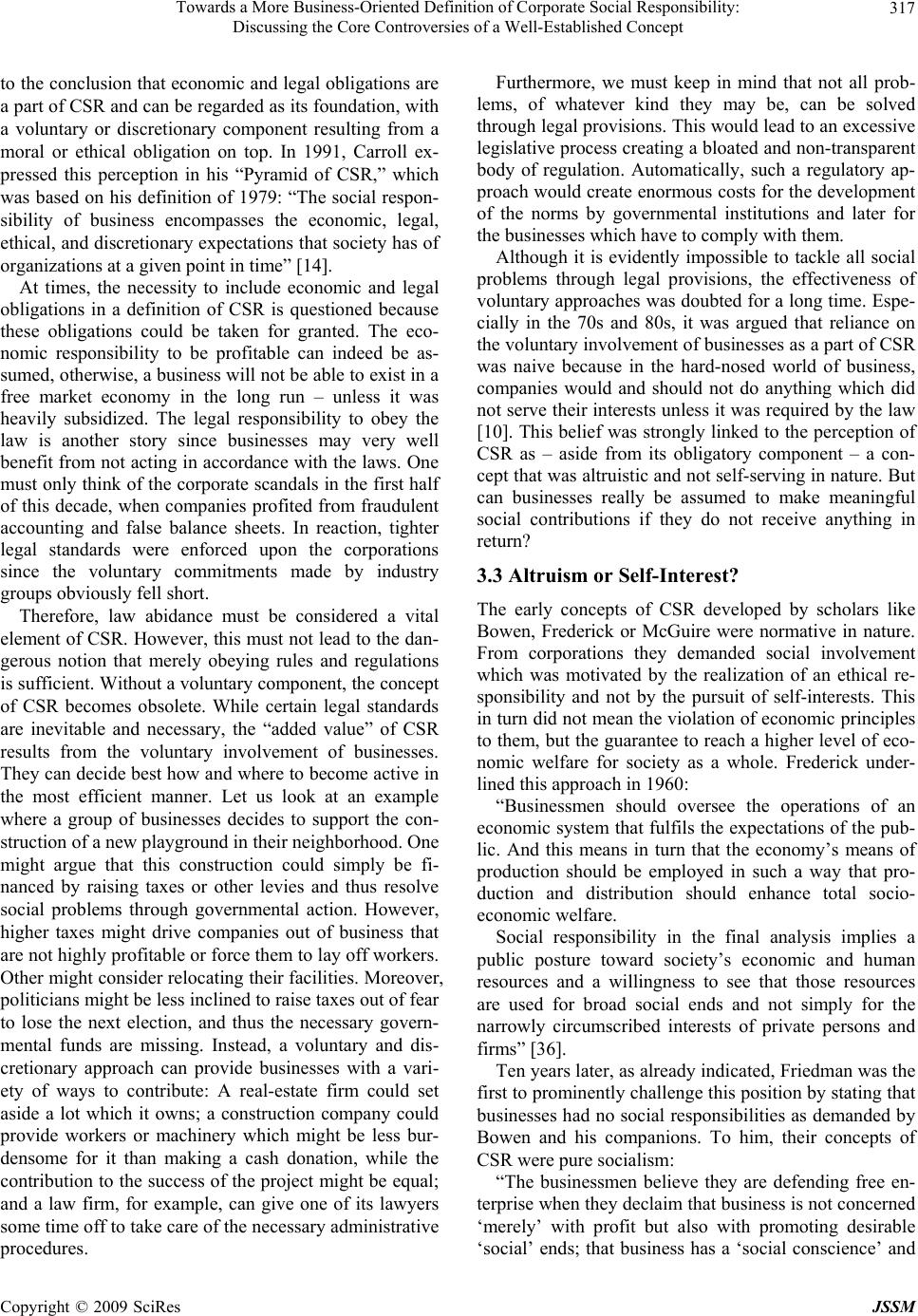 Towards a More Business-Oriented Definition of Corporate Social Responsibility: 317 Discussing the Core Controversies of a Well-Established Concept to the conclusion that economic and leg al obligations are a part of CSR and can be regarded as its foundation, with a voluntary or discretionary component resulting from a moral or ethical obligation on top. In 1991, Carroll ex- pressed this perception in his “Pyramid of CSR,” which was based on his definition of 1979: “The social respon- sibility of business encompasses the economic, legal, ethical, and discretionary expectations that society has of organizations at a given point in time” [14]. At times, the necessity to include economic and legal obligations in a definition of CSR is questioned because these obligations could be taken for granted. The eco- nomic responsibility to be profitable can indeed be as- sumed, otherwise, a business will not be able to exist in a free market economy in the long run – unless it was heavily subsidized. The legal responsibility to obey the law is another story since businesses may very well benefit from not acting in accord ance with the laws. One must only think of the corporate scand als in the first half of this decade, when companies profited from fraudulent accounting and false balance sheets. In reaction, tighter legal standards were enforced upon the corporations since the voluntary commitments made by industry groups obviously fell short. Therefore, law abidance must be considered a vital element of CSR. However, this must not lead to the dan- gerous notion that merely obeying rules and regulations is sufficient. Without a voluntary component, the concept of CSR becomes obsolete. While certain legal standards are inevitable and necessary, the “added value” of CSR results from the voluntary involvement of businesses. They can decide best how and where to become active in the most efficient manner. Let us look at an example where a group of businesses decides to support the con- struction of a new playgro und in their neighborhood. One might argue that this construction could simply be fi- nanced by raising taxes or other levies and thus resolve social problems through governmental action. However, higher taxes might drive companies out of business that are not highly profitable or force them to lay off workers. Other might consider relocating their facilities. Moreover, politicians might be less inclined to raise taxes out of fear to lose the next election, and thus the necessary govern- mental funds are missing. Instead, a voluntary and dis- cretionary approach can provide businesses with a vari- ety of ways to contribute: A real-estate firm could set aside a lot which it owns; a construction company could provide workers or machinery which might be less bur- densome for it than making a cash donation, while the contribution to the success of the project might be equal; and a law firm, for example, can give one of its lawyers some time off to take care of the necessary administrative procedures. Furthermore, we must keep in mind that not all prob- lems, of whatever kind they may be, can be solved through lega l provisions. This wou ld lead to an excessive legislative process creating a bloated and non-transparent body of regulation. Automatically, such a regulatory ap- proach would create enormous costs for the development of the norms by governmental institutions and later for the businesses which have to comply with them. Although it is evidently impossible to tackle all social problems through legal provisions, the effectiveness of voluntary approaches was doubted for a long time. Espe- cially in the 70s and 80s, it was argued that reliance on the voluntary involv ement of businesses as a part of CSR was naive because in the hard-nosed world of business, companies would and should not do anything which did not serve their interests unless it was required by the law [10]. This belief was strongly linked to the perception of CSR as – aside from its obligatory component – a con- cept that was altruistic and not self-serving in nature. But can businesses really be assumed to make meaningful social contributions if they do not receive anything in return? 3.3 Altruism or Self-Interest? The early concepts of CSR developed by scholars like Bowen, Frederick or McGuire were normative in nature. From corporations they demanded social involvement which was motivated by the realization of an ethical re- sponsibility and not by the pursuit of self-interests. This in turn did not mean the violation of economic principles to them, but the guarantee to reach a higher level of eco- nomic welfare for society as a whole. Frederick under- lined this approach in 1960: “Businessmen should oversee the operations of an economic system that fulfils the expectations of the pub- lic. And this means in turn that the economy’s means of production should be employed in such a way that pro- duction and distribution should enhance total socio- economic welfare. Social responsibility in the final analysis implies a public posture toward society’s economic and human resources and a willingness to see that those resources are used for broad social ends and not simply for the narrowly circumscribed interests of private persons and firms” [36]. Ten years later, as already indicated, Friedman was the first to prominently challenge this po sition by stating th at businesses had no social responsibilities as demanded by Bowen and his companions. To him, their concepts of CSR were pure socialism: “The businessmen believe they are defending free en- terprise when they declaim that business is not concerned ‘merely’ with profit but also with promoting desirable ‘social’ ends; that business has a ‘social conscience’ and Copyright © 2009 SciRes JSSM 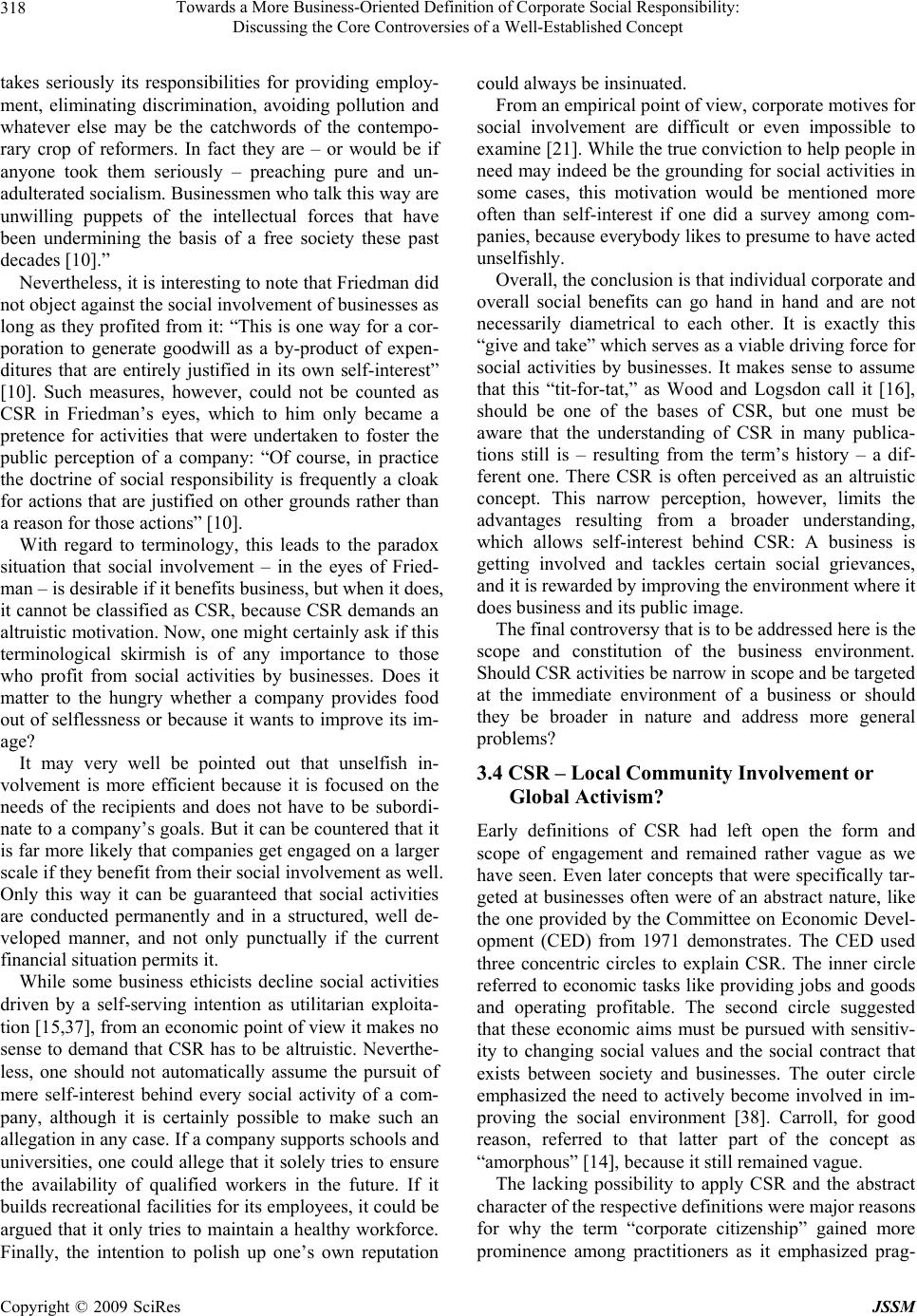 Towards a More Business-Oriented Definition of Corporate Social Responsibility: 318 Discussing the Core Controversies of a Well-Established Concept takes seriously its responsibilities for providing employ- ment, eliminating discrimination, avoiding pollution and whatever else may be the catchwords of the contempo- rary crop of reformers. In fact they are – or would be if anyone took them seriously – preaching pure and un- adulterated socialis m. Businessmen who talk this way are unwilling puppets of the intellectual forces that have been undermining the basis of a free society these past decades [10].” Nevertheless, it is interesting to note that Friedman did not object against the social involvement of businesses as long as they profited from it: “This is on e way for a cor- poration to generate goodwill as a by-product of expen- ditures that are entirely justified in its own self-interest” [10]. Such measures, however, could not be counted as CSR in Friedman’s eyes, which to him only became a pretence for activities that were undertaken to foster the public perception of a company: “Of course, in practice the doctrine of social responsibility is frequently a cloak for actions that are justified on other grounds rather than a reason for those actions” [10]. With regard to terminology, this leads to the paradox situation that social involvement – in the eyes of Fried- man – is desirable if it benefits business, but when it does, it cannot be classified as CSR, because CSR demands an altruistic motivation. Now, one might certainly ask if th is terminological skirmish is of any importance to those who profit from social activities by businesses. Does it matter to the hungry whether a company provides food out of selflessness or because it wants to improve its im- age? It may very well be pointed out that unselfish in- volvement is more efficient because it is focused on the needs of the recipients and does not have to be subordi- nate to a company’s goals. But it can be countered that it is far more likely that companies get engaged on a larger scale if they benefit from their social involvemen t as well. Only this way it can be guaranteed that social activities are conducted permanently and in a structured, well de- veloped manner, and not only punctually if the current financial situation permits it. While some business ethicists decline social activities driven by a self-serving intention as utilitarian exploita- tion [15,37], from an econ omic point of view it makes no sense to demand that CSR has to be altruistic. Neverthe- less, one should not automatically assume the pursuit of mere self-interest behind every social activity of a com- pany, although it is certainly possible to make such an allegation in any case. If a company supports schools and universities, one could allege that it so lely tries to ensure the availability of qualified workers in the future. If it builds recreational facilities for its employees, it could be argued that it only tries to maintain a healthy workforce. Finally, the intention to polish up one’s own reputation could always be insinuated. From an empirical point of view, corporate motives for social involvement are difficult or even impossible to examine [21]. While the true conviction to help people in need may indeed be the grounding for social activities in some cases, this motivation would be mentioned more often than self-interest if one did a survey among com- panies, because everybody likes to pr esume to have acted unselfishly. Overall, the conclusion is th at individu al corporate and overall social benefits can go hand in hand and are not necessarily diametrical to each other. It is exactly this “give and take” which serves as a viab le driving force for social activities by businesses. It makes sense to assume that this “tit-for-tat,” as Wood and Logsdon call it [16], should be one of the bases of CSR, but one must be aware that the understanding of CSR in many publica- tions still is – resulting from the term’s history – a dif- ferent one. There CSR is often perceived as an altruistic concept. This narrow perception, however, limits the advantages resulting from a broader understanding, which allows self-interest behind CSR: A business is getting involved and tackles certain social grievances, and it is rewarded by improving the environment where it does business and its public image. The final controversy that is to be addressed here is the scope and constitution of the business environment. Should CSR activities be n arrow in sco p e and b e targ eted at the immediate environment of a business or should they be broader in nature and address more general problems? 3.4 CSR – Local Community Involvement or Global Activism? Early definitions of CSR had left open the form and scope of engagement and remained rather vague as we have seen. Even later concepts that were specifically tar- geted at businesses often were of an abstract nature, like the one provided by the Committee on Economic Devel- opment (CED) from 1971 demonstrates. The CED used three concentric circles to explain CSR. The inner circle referred to econ omic tasks like providing jo bs and goods and operating profitable. The second circle suggested that these economic aims must be pursued with sensitiv- ity to changing social values and the social contract that exists between society and businesses. The outer circle emphasized the need to actively become involved in im- proving the social environment [38]. Carroll, for good reason, referred to that latter part of the concept as “amorphous” [14 ], because it still remained vague. The lacking possibility to apply CSR and the abstract character of the respective definitions were major reasons for why the term “corporate citizenship” gained more prominence among practitioners as it emphasized prag- Copyright © 2009 SciRes JSSM 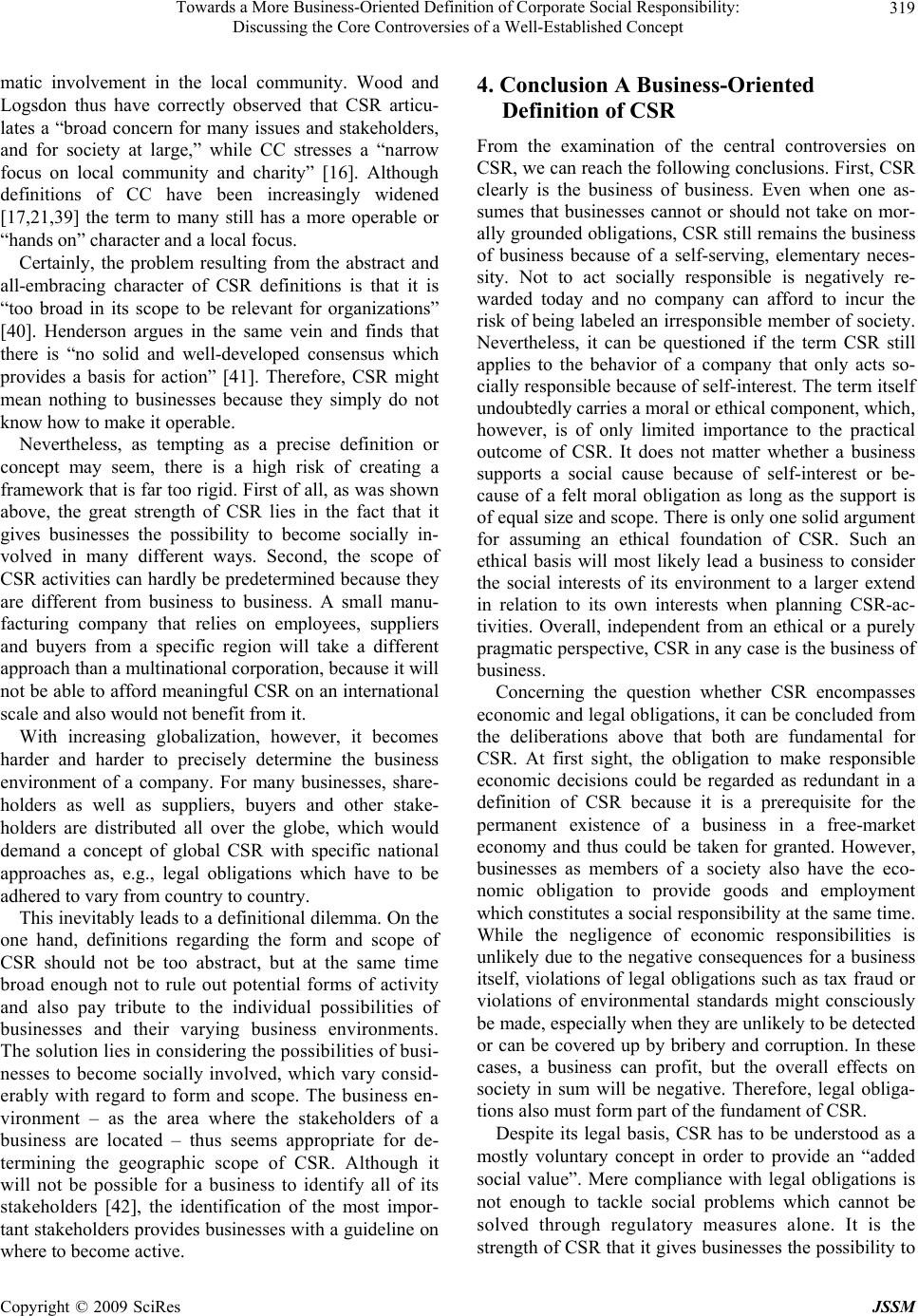 Towards a More Business-Oriented Definition of Corporate Social Responsibility: 319 Discussing the Core Controversies of a Well-Established Concept matic involvement in the local community. Wood and Logsdon thus have correctly observed that CSR articu- lates a “broad concern for many issues and stakeholders, and for society at large,” while CC stresses a “narrow focus on local community and charity” [16]. Although definitions of CC have been increasingly widened [17,21,39] the term to many still has a more operable or “hands on” character and a local focus. Certainly, the problem resulting from the abstract and all-embracing character of CSR definitions is that it is “too broad in its scope to be relevant for organizations” [40]. Henderson argues in the same vein and finds that there is “no solid and well-developed consensus which provides a basis for action” [41]. Therefore, CSR might mean nothing to businesses because they simply do not know how to make it operable. Nevertheless, as tempting as a precise definition or concept may seem, there is a high risk of creating a framework that is far too rigid. First of all, as was shown above, the great strength of CSR lies in the fact that it gives businesses the possibility to become socially in- volved in many different ways. Second, the scope of CSR activities can hardly be predetermined because they are different from business to business. A small manu- facturing company that relies on employees, suppliers and buyers from a specific region will take a different approach than a multinational corporation, because it will not be able to afford meaning ful CSR on an international scale and also would not benefit from it. With increasing globalization, however, it becomes harder and harder to precisely determine the business environment of a company. For many businesses, share- holders as well as suppliers, buyers and other stake- holders are distributed all over the globe, which would demand a concept of global CSR with specific national approaches as, e.g., legal obligations which have to be adhered to vary from country to country. This inevitably leads to a definitiona l dilemma. On the one hand, definitions regarding the form and scope of CSR should not be too abstract, but at the same time broad enough not to rule out potential forms of activity and also pay tribute to the individual possibilities of businesses and their varying business environments. The solution lies in considering the possibilities of busi- nesses to become socially involved, which vary consid- erably with regard to form and scope. The business en- vironment – as the area where the stakeholders of a business are located – thus seems appropriate for de- termining the geographic scope of CSR. Although it will not be possible for a business to identify all of its stakeholders [42], the identification of the most impor- tant stakeholders provides businesses with a guideline on where to become active. 4. Conclusion A Business-Oriented Definition of CSR From the examination of the central controversies on CSR, we can reach the following conclusions. First, CSR clearly is the business of business. Even when one as- sumes that businesses cannot or should not take on mor- ally grounded oblig ations, CSR still remains the business of business because of a self-serving, elementary neces- sity. Not to act socially responsible is negatively re- warded today and no company can afford to incur the risk of being labeled an irresponsible member of society. Nevertheless, it can be questioned if the term CSR still applies to the behavior of a company that only acts so- cially responsible because of self-interest. The term itself undoubtedly carries a moral or ethical component, which, however, is of only limited importance to the practical outcome of CSR. It does not matter whether a business supports a social cause because of self-interest or be- cause of a felt moral obligation as long as the support is of equal size an d scope. There is on ly on e solid argu ment for assuming an ethical foundation of CSR. Such an ethical basis will most likely lead a business to consider the social interests of its environment to a larger extend in relation to its own interests when planning CSR-ac- tivities. Overall, independent from an ethical or a purely pragmatic perspective, CSR in any case is the business of business. Concerning the question whether CSR encompasses economic and legal oblig ations, it can be conclud ed from the deliberations above that both are fundamental for CSR. At first sight, the obligation to make responsible economic decisions could be regarded as redundant in a definition of CSR because it is a prerequisite for the permanent existence of a business in a free-market economy and thus could be taken for granted. However, businesses as members of a society also have the eco- nomic obligation to provide goods and employment which constitutes a social respon sibility at the same time. While the negligence of economic responsibilities is unlikely due to the negative consequences for a business itself, violations of legal obligations such as tax fraud or violations of environmental standards might consciously be made, especially when they are unlikely to be detected or can be covered up by bribery and corruption. In these cases, a business can profit, but the overall effects on society in sum will be negative. Therefore, legal obliga- tions also must form part of the fundament of CSR. Despite its legal basis, CSR has to be understood as a mostly voluntary concept in order to provide an “added social value”. Mere compliance with legal obligations is not enough to tackle social problems which cannot be solved through regulatory measures alone. It is the strength of CSR that it giv es businesses the possibility to Copyright © 2009 SciRes JSSM 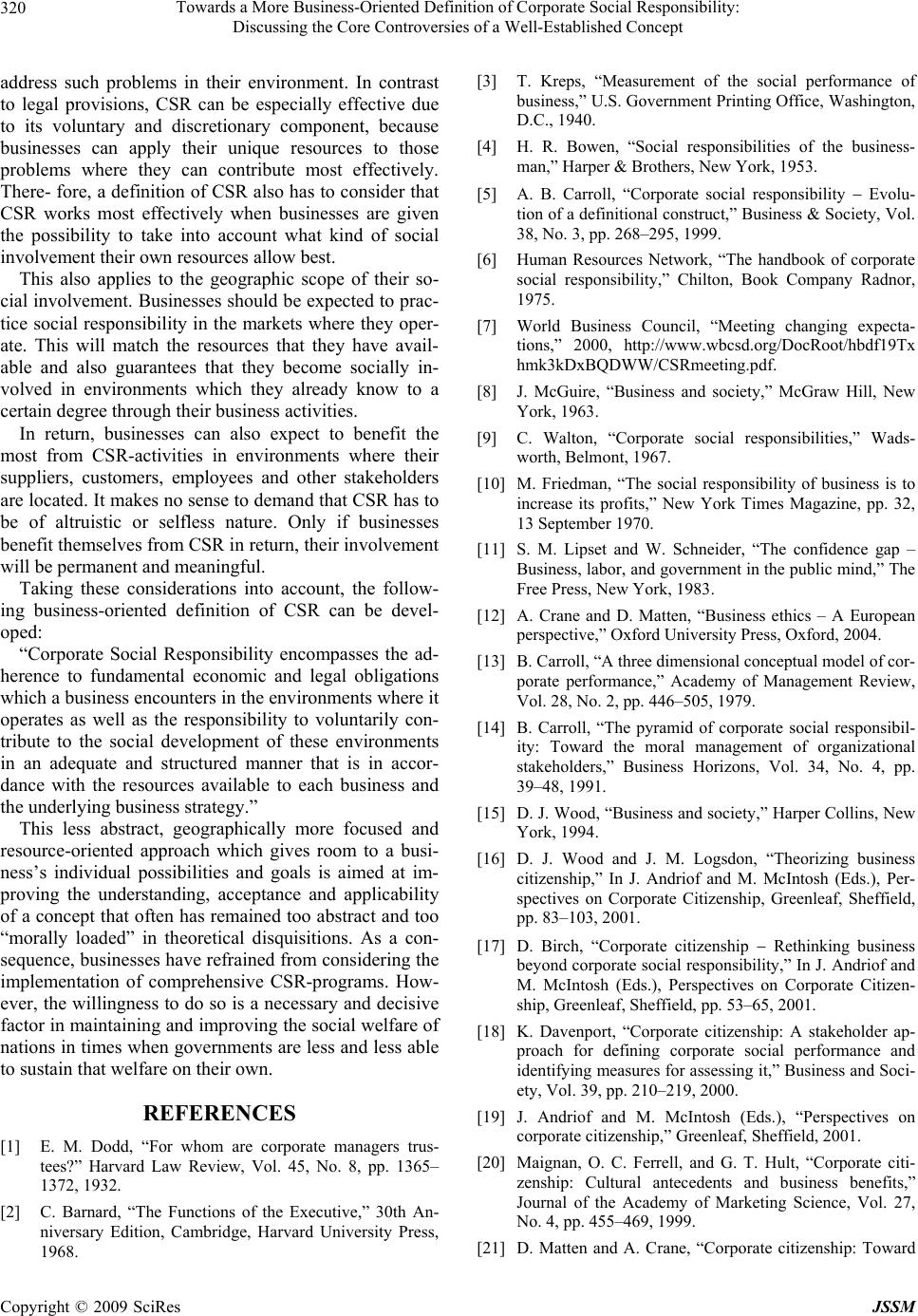 Towards a More Business-Oriented Definition of Corporate Social Responsibility: 320 Discussing the Core Controversies of a Well-Established Concept address such problems in their environment. In contrast to legal provisions, CSR can be especially effective due to its voluntary and discretionary component, because businesses can apply their unique resources to those problems where they can contribute most effectively. There- fore, a definition of CSR also has to consider that CSR works most effectively when businesses are given the possibility to take into account what kind of social involvement their own resources allow best. This also applies to the geographic scope of their so- cial involvement. Businesses should be expected to prac- tice social responsibility in the markets where they oper- ate. This will match the resources that they have avail- able and also guarantees that they become socially in- volved in environments which they already know to a certain degree through their business activities. In return, businesses can also expect to benefit the most from CSR-activities in environments where their suppliers, customers, employees and other stakeholders are located. It makes no sense to demand that CSR has to be of altruistic or selfless nature. Only if businesses benefit themselves from CSR in return, their involv ement will be permanent and meaningful. Taking these considerations into account, the follow- ing business-oriented definition of CSR can be devel- oped: “Corporate Social Responsibility encompasses the ad- herence to fundamental economic and legal obligations which a business encounters in the environments where it operates as well as the responsibility to voluntarily con- tribute to the social development of these environments in an adequate and structured manner that is in accor- dance with the resources available to each business and the underlying business strategy.” This less abstract, geographically more focused and resource-oriented approach which gives room to a busi- ness’s individual possibilities and goals is aimed at im- proving the understanding, acceptance and applicability of a concept that often has remained too abstract and too “morally loaded” in theoretical disquisitions. As a con- sequence, businesses have refrained from considering the implementation of comprehensive CSR-programs. How- ever, the willingness to do so is a necessary and decisive factor in maintaining and improving the so cial welfare of nations in times when governments are less and less able to sustain that welfare on their own. REFERENCES [1] E. M. Dodd, “For whom are corporate managers trus- tees?” Harvard Law Review, Vol. 45, No. 8, pp. 1365– 1372, 1932. [2] C. Barnard, “The Functions of the Executive,” 30th An- niversary Edition, Cambridge, Harvard University Press, 1968. [3] T. Kreps, “Measurement of the social performance of business,” U.S. Government Printing Office, Washington, D.C., 1940. [4] H. R. Bowen, “Social responsibilities of the business- man,” Harper & Brothers, New York, 1953. [5] A. B. Carroll, “Corporate social responsibility Evolu- tion of a definitional construct,” Business & Society, Vol. 38, No. 3, pp. 268–295, 1999. [6] Human Resources Network, “The handbook of corporate social responsibility,” Chilton, Book Company Radnor, 1975. [7] World Business Council, “Meeting changing expecta- tions,” 2000, http://www.wbcsd.org/DocRoot/hbdf19Tx hmk3kDxBQDWW/CSRmeeting.pdf. [8] J. McGuire, “Business and society,” McGraw Hill, New York, 1963. [9] C. Walton, “Corporate social responsibilities,” Wads- worth, Belmont, 1967. [10] M. Friedman, “The social responsibility of business is to increase its profits,” New York Times Magazine, pp. 32, 13 September 1970. [11] S. M. Lipset and W. Schneider, “The confidence gap – Business, labor, and government in the public mind,” The Free Press, New York, 1983. [12] A. Crane and D. Matten, “Business ethics – A European perspective,” Oxford University Press, Oxford, 2004. [13] B. Carroll, “A three dimensional conceptual model of cor- porate performance,” Academy of Management Review, Vol. 28, No. 2, pp. 446–505, 1979. [14] B. Carroll, “The pyramid of corporate social responsibil- ity: Toward the moral management of organizational stakeholders,” Business Horizons, Vol. 34, No. 4, pp. 39–48, 1991. [15] D. J. Wood, “Business and society,” Harper Collins, New York, 1994. [16] D. J. Wood and J. M. Logsdon, “Theorizing business citizenship,” In J. Andriof and M. McIntosh (Eds.), Per- spectives on Corporate Citizenship, Greenleaf, Sheffield, pp. 83–103, 2001. [17] D. Birch, “Corporate citizenship Rethinking business beyond corporate social responsibility,” In J. Andriof and M. McIntosh (Eds.), Perspectives on Corporate Citizen- ship, Greenleaf, Sheffield, pp. 53–65, 2001. [18] K. Davenport, “Corporate citizenship: A stakeholder ap- proach for defining corporate social performance and identifying measures for assessing it,” Business and Soci- ety, Vol. 39, pp. 210–219, 2000. [19] J. Andriof and M. McIntosh (Eds.), “Perspectives on corporate citizenship,” Greenleaf, Sheffield, 2001. [20] Maignan, O. C. Ferrell, and G. T. Hult, “Corporate citi- zenship: Cultural antecedents and business benefits,” Journal of the Academy of Marketing Science, Vol. 27, No. 4, pp. 455–469, 1999. [21] D. Matten and A. Crane, “Corporate citizenship: Toward Copyright © 2009 SciRes JSSM 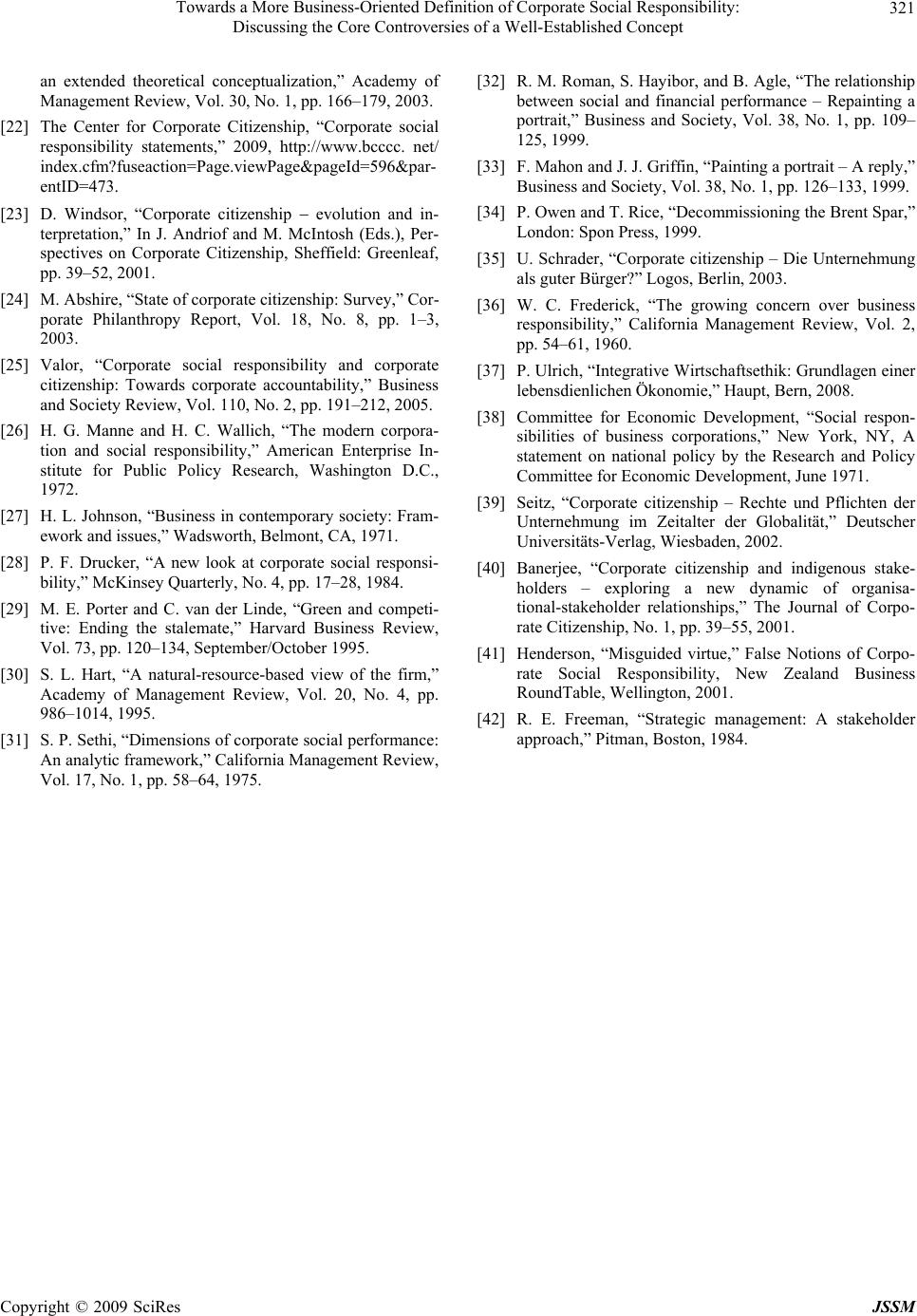 Towards a More Business-Oriented Definition of Corporate Social Responsibility: Discussing the Core Controversies of a Well-Established Concept Copyright © 2009 SciRes JSSM 321 an extended theoretical conceptualization,” Academy of Management Review, Vol. 30, No. 1, pp. 166–179, 2003. [22] The Center for Corporate Citizenship, “Corporate social responsibility statements,” 2009, http://www.bcccc. net/ index.cfm?fuseaction=Page.viewPage&pageId=596&par- entID=473. [23] D. Windsor, “Corporate citizenship evolution and in- terpretation,” In J. Andriof and M. McIntosh (Eds.), Per- spectives on Corporate Citizenship, Sheffield: Greenleaf, pp. 39–52, 2001. [24] M. Abshire, “State of corporate citizenship: Survey,” Cor- porate Philanthropy Report, Vol. 18, No. 8, pp. 1–3, 2003. [25] Valor, “Corporate social responsibility and corporate citizenship: Towards corporate accountability,” Business and Society Review, Vol. 110, No. 2, pp. 191–212, 2005. [26] H. G. Manne and H. C. Wallich, “The modern corpora- tion and social responsibility,” American Enterprise In- stitute for Public Policy Research, Washington D.C., 1972. [27] H. L. Johnson, “Business in contemporary society: Fram- ework and issues,” Wadsworth, Belmont, CA, 1971. [28] P. F. Drucker, “A new look at corporate social responsi- bility,” McKinsey Quarterly, No. 4, pp. 17–28, 1984. [29] M. E. Porter and C. van der Linde, “Green and competi- tive: Ending the stalemate,” Harvard Business Review, Vol. 73, pp. 120–134, September/October 1995. [30] S. L. Hart, “A natural-resource-based view of the firm,” Academy of Management Review, Vol. 20, No. 4, pp. 986–1014, 1995. [31] S. P. Sethi, “Dimensions of corporate social performance: An analytic framework,” California Management Review, Vol. 17, No. 1, pp. 58–64, 1975. [32] R. M. Roman, S. Hayibor, and B. Agle, “The relationship between social and financial performance – Repainting a portrait,” Business and Society, Vol. 38, No. 1, pp. 109– 125, 1999. [33] F. Mahon and J. J. Griffin, “Painting a portrait – A reply,” Business and Society, Vol. 38, No. 1, pp. 126–133, 1999. [34] P. Owen and T. Rice, “Decommissioning the Brent Spar,” London: Spon Press, 1999. [35] U. Schrader, “Corporate citizenship – Die Unternehmung als guter Bürger?” Logos, Berlin, 2003. [36] W. C. Frederick, “The growing concern over business responsibility,” California Management Review, Vol. 2, pp. 54–61, 1960. [37] P. Ulrich, “Integrative Wirtschaftsethik: Grundlagen einer lebensdienlichen Ökonomie,” Haupt, Bern, 2008. [38] Committee for Economic Development, “Social respon- sibilities of business corporations,” New York, NY, A statement on national policy by the Research and Policy Committee for Economic Development, June 1971. [39] Seitz, “Corporate citizenship – Rechte und Pflichten der Unternehmung im Zeitalter der Globalität,” Deutscher Universitäts-Verlag, Wiesbaden, 2002. [40] Banerjee, “Corporate citizenship and indigenous stake- holders – exploring a new dynamic of organisa- tional-stakeholder relationships,” The Journal of Corpo- rate Citizenship, No. 1, pp. 39–55, 2001. [41] Henderson, “Misguided virtue,” False Notions of Corpo- rate Social Responsibility, New Zealand Business RoundTable, Wellington, 2001. [42] R. E. Freeman, “Strategic management: A stakeholder approach,” Pitman, Boston, 1984. |

